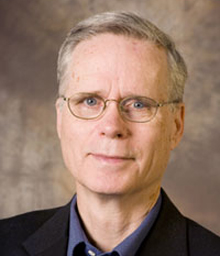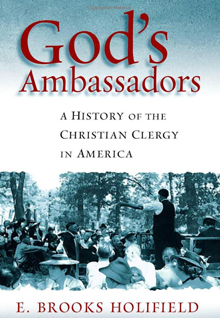
E. Brooks Holifield's name is not a household word among the general public, but he's a giant among historians of religion.
Holifield, Charles Howard Candler of American Church History Emeritus at Emory's Candler School of Theology, retired quietly in 2011 — perhaps a little too quietly for colleagues here and at universities across the U.S., Canada and England. Several dozen of them gathered recently in Atlanta to discuss "Theology, National Character and Religiosity," a conference with the dual purpose of honoring Holifield and his work, and sparking new conversations about his latest research project.
"Brooks has retired from teaching, but he's not retired from being a scholar," says Jonathan Strom, associate professor of church history at Candler and conference organizer. Holifield's current research centers on the question: Why are Americans so religious, and how did they get that way?
If the topic seems both broad and cutting edge for someone who's retired, that's part of what makes Holifield as scholar and historian so distinctive, says Strom.
Holifield's influence
"Initially, I don’t think Brooks set out to shape the entire field," says Strom, citing Holifield's first book, "The Covenant Sealed: The Development of Puritan Sacramental Theology in Old and New England, 1570-1720" (Yale, 1974). While the subject matter was narrow in some respects, says Strom, "Brooks does such terrific work that it has real staying power. Many of his books will stay standard in some ways."
Holifield was part of a new generation of scholars who looked anew at previous misconceptions about historical theology and had a "very clear focus on theology and getting the ideas right," says Strom.

Holifield also moved toward social as well as cultural history to interpret the American religious landscape, as he wrote about: theology and Southern culture in the 19th century, a history of pastoral care in America, "Health and Medicine in the Methodist Tradition," American thought and culture before the 18th century, and his latest award winning books, "Theology in America: Christian Thought from the Age of the Puritans to the Civil War (Yale, 2003) and "God's Ambassadors: A History of the Christian Clergy in America" (Eerdmans, 2007).
"One of the things that's unusual about Brooks is not just the chronological spread of his works, but the methodological breadth as well. You have a historian working in a number of different registers, dealing with different kinds of materials," says Strom. "That's one of the things that makes him distinctive as a scholar."
Already Holifield has given a series of lectures on "why Americans are so religious" at Union Presbyterian Seminary (The 2013 Sprunt Lectures), but the recent conference should provide him much more food for thought that results in the depth of scholarship for which he is known.
Presentations ranged from a lecture by Grant Wacker of Duke University on "Billy Graham and the Shaping of Contemporary Culture," to David Hall of Harvard Divinity School on "Why Theology Matters (and why to some historians it doesn't)," to Christine Heyrman of the University of Delaware on "Going Global in the Early Republic, or What Brooks Holifield Taught Me About Evangelical Views of Islam."
One session featured presentations by two of Holifield's former graduate students, Linda Schearing of Gonzaga University on "The Quest for Paradise: Looking for Eden in All the Wrong Places," and Val Ziegler of DePauw University, whose presentation dealt with "Christian Erotic Wife Spanking" subtitled "How I Learned from Brooks Holifield to Write about Sex and Humor."
Sex and humor among the Puritans?
"Although Brooks does not claim scholarlyexpertise in the topics [they presented], his legacy lives on in the way they explained and communicated their arresting ideas—in the way they learned to write and do research. He taught us all how to do this," says Stacia Brown, who holds a Ph.D. from Emory's Graduate Division of Religion and is one of Holifield's former students. "He's taught his students to be the kind of scholars and creative thinkers that they are."
Brown, currently a director of development at Emory's School of Medicine who last year published her first novel, says Holifield is a champion of creativity.
"For all his very methodical, careful rigorous scholarship, I see that he has this kind of inner novelist, this really creative, curious streak, that he loves to see in his students," says Brown. "One of the surprises of the conference was that it wasn't just honoring him as a scholar but also as a creative thinker."
Holifield on seeing
For his part, Holifield said he was overwhelmed and deeply grateful for the conference and to "the moderators and presenters whose papers have been stimulating for me and have driven me back to the drawing board on my own project that I will now have to reconsider in sometimes distressingly new ways."
In his response to the dozens of friends, colleagues and former students, Holifield, in typical fashion, turned the spotlight back on them: "What you do as historians, and do so well," he said, "is to help [students] find ways of getting outside themselves, of getting into another reality, a foreign reality, a distant reality, that they might want to resist, that they might see as strange, but in which for a moment, for one precious moment, they have to dwell."
Whatever his retirement status, it's clear that Holifield is still teaching, still learning.
"As historians, I think we are engaged in a process of naming and seeing and helping others name and see," said Holifield to the assembled. "There's an irony about that, that you have to name in order to see, but a premature naming can prevent your seeing. Our task, I think, is to name the past in order to see it, and that's what we learn from one another. We learn new names, new ways of seeing."
